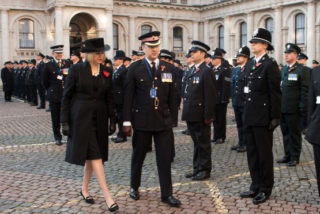Great leaders unite society and find workable solutions to the big problems that weaker souls shy away from. Gladstone, Lloyd George, Churchill and Thatcher are four heavyweights who’s names resonate through history for the imprint they made on society in times of difficulty. Theresa May’s legacy will be her ability to lead Britain safely through a political minefield and emerge as a stronger country that is more united, prosperous and respected for generations to come.
Her task is an awesome one in which she must negotiate and fight for her country on multiple fronts, a challenge that has not confronted a Prime Minister since the dark years preceding the Second World War. She will have many battles. Some will be against impossible odds. However, there is one war that makes economic and social sense, which the new Prime Minister can fight and win: the war on fraud.
Popular politicians are ten a penny. A little charisma, charm and promises of jam tomorrow are vote winners the world over. Exceptional statesmen and women are a rare breed whose characteristics can be the polar opposite. They plan for future generations, not future elections or personal careers. Above all, they have an almost super human ability to unite society and galvanise support for ‘doing the right thing’, when the popular view is to ignore the problem, give up hope or deflect public attention onto side issues.
Brexit has given Britons a renewed interest in politics. Much attention has focused on the UK’s contribution to the European Union and its alleged waste and bureaucracy, though the facts are still being debated. An issue that is undeniable and closer to home is the mountain of financial and economic loss the United Kingdom suffers as a consequence of fraud and how saving even a small proportion of the estimated £193 billion loss would be a welcome injection into the economy at this time of great uncertainty.
Britain’s tough, new leader knows from her years in command at the Home Office that corruption and fraud inflicts appalling harm, from the young girls trafficked for prostitution, to the company put out of business by a competitor who launders money for criminals.
Theresa May also knows that very soon, fraud reports will be included in the national statistics, lifting the veil on this hidden crime and revealing it as the most prevalent crime in the UK. Earlier this year, as Home Secretary, May launched a new taskforce to crack down on fraud in the UK, saying that “fraud shames our financial system”.
The recent report published by the Fraud Advisory Panel gave a damning assessment of the government’s disjointed approach to fighting fraud ten years after the Fraud Review. Lord Goldsmith, the visionary former Attorney General who commissioned the Review praised the City of London Police for their efforts but expressed his concern at the lack of strategic coordination across sectors following the demise of the National Fraud Authority.
The Fraud Review made 62 recommendations to make the UK more resilient to fraud. All were accepted and some were implemented. The need for a war on fraud was not understood in 2006, the losses and consequences were hidden in the boom years and bad news doesn’t win votes. Lord Goldsmith turned the spotlight on this dirty crime because it was the right thing to do and he had the skills and courage that galvanised support and made things happen.
Our new Prime Minister is arguably the most qualified person in Britain to address the unfinished business from the Fraud Review and launch a new war on fraud. This will be a hard fight but one that the New Iron Lady can win.
Photo: Theresa May inspects the police guard of honour at the Cenotaph in Whitehall accompanied by Chief Superintendent David Clarke, Detachment Commander, November 2011

